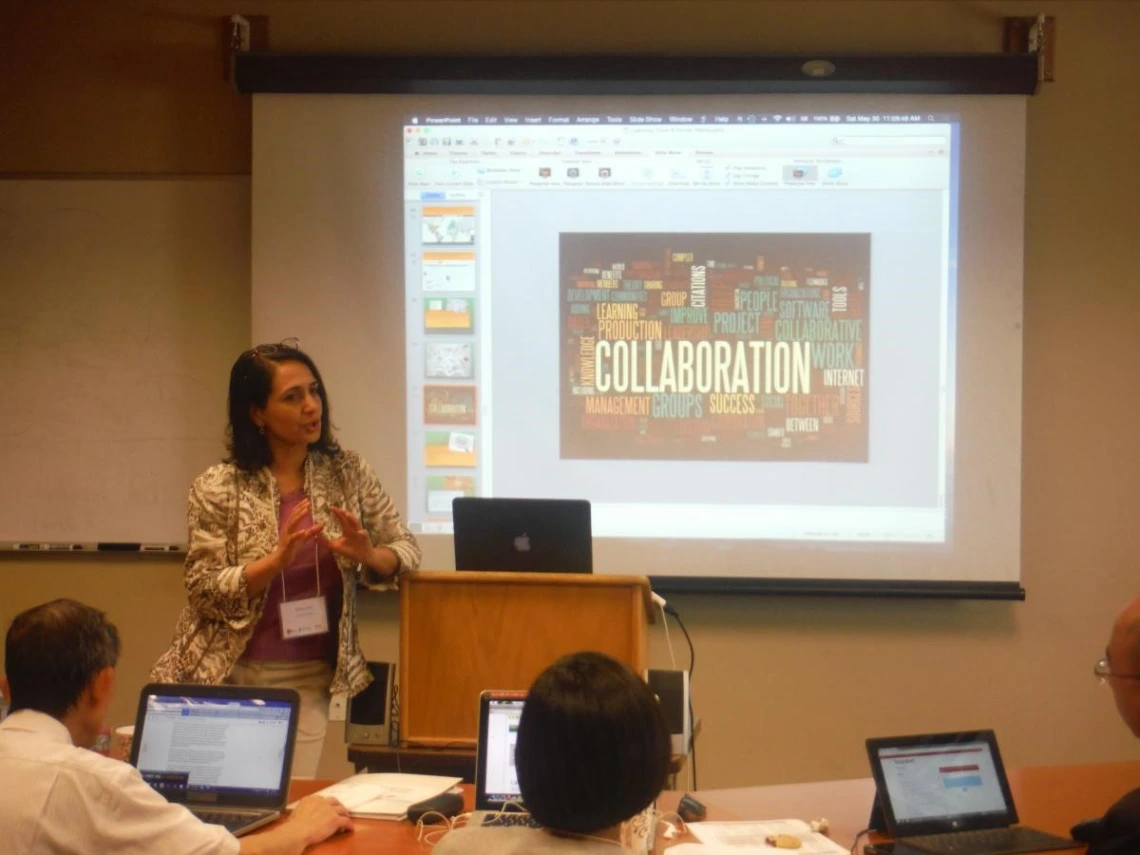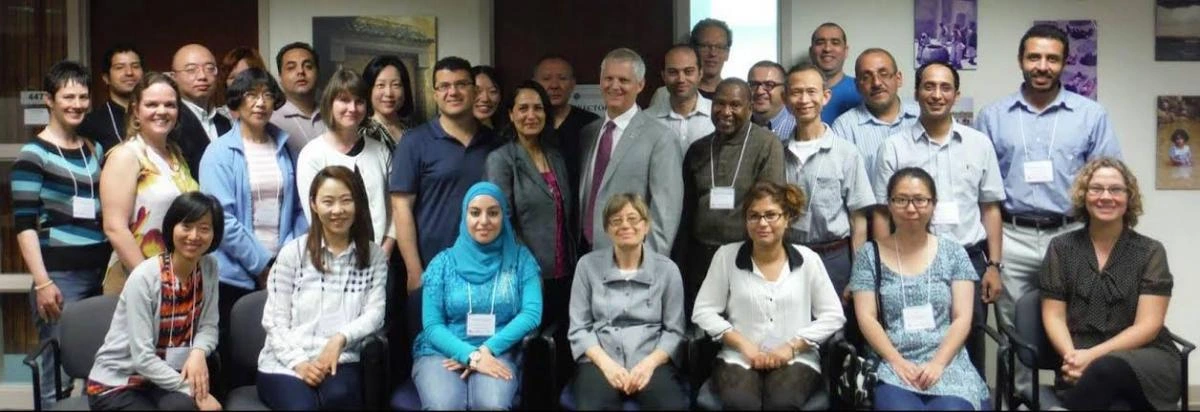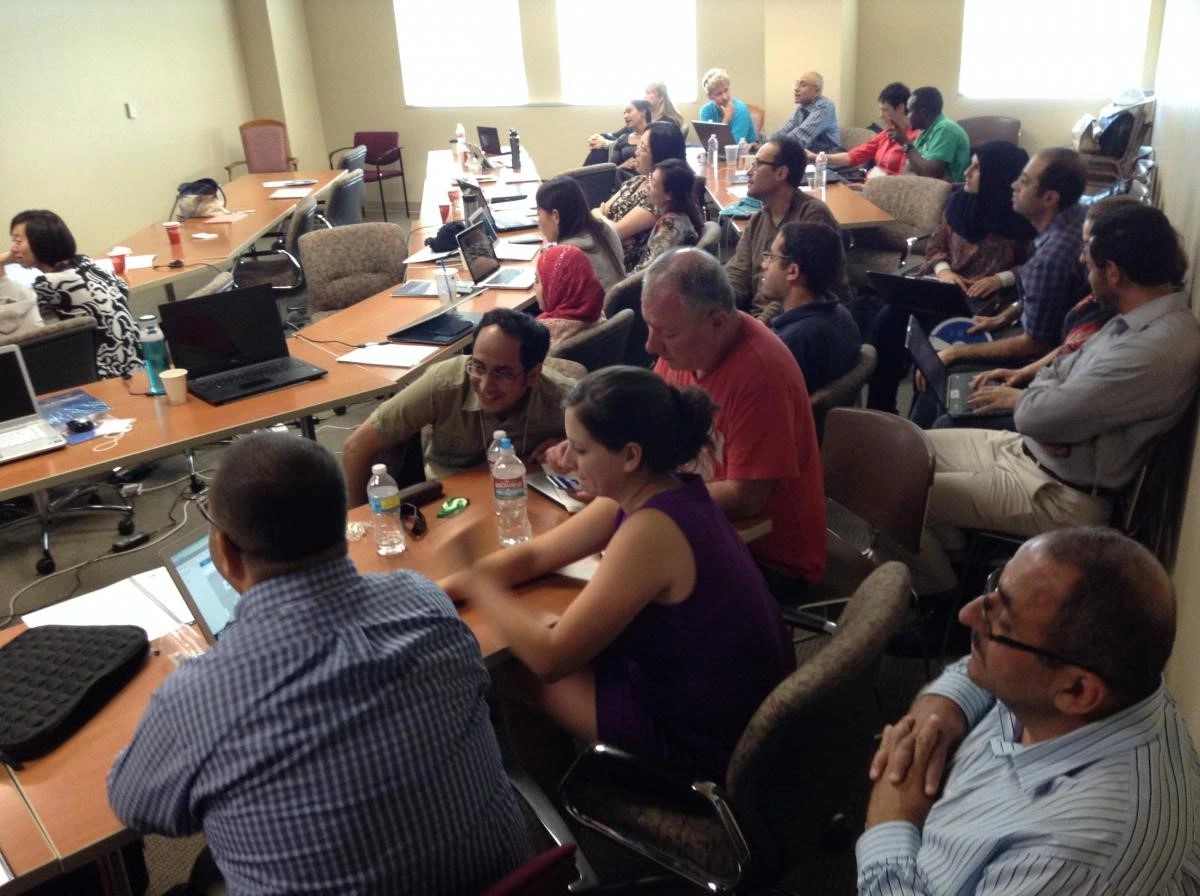Innovative Technology in the Language Learning Classroom

Dr. Sonia Shiri gives the opening address at the workshop series: Innovative Technology in the Language Learning Classroom.
The desire to collaborate across departments to create lasting impacts is at the heart of the Arizona Arabic Flagship. The Center for Educational Resources in Culture, Language and Literacy (CERCLL) and the Graduate Interdisciplinary Program in Second Language Acquisition and Teaching (SLAT) continue to be important campus units for collaboration on advances in language pedagogy. From May 26, 2015 to June 5, 2015, the Arizona Arabic Flagship in collaboration CERCLL and SLAT held a Flagship teacher training workshop entitled: Innovative Technologies for Advanced Language and Cultural Learning. The workshop was supported by a Flagship teacher training grant awarded to the Arizona Arabic Flagship and CERCLL in fall 2014. X faculty members from partnering Flagship and Project GO institutions from around the country applied, were accepted, and participated in the workshop. The two-week workshop was held on the University of Arizona campus at the School of Middle Eastern and North African Studies. The second week of the workshop series was open to all full-time K-12 language educators and was heavily advertised. Four of the UA program’s Arabic instructors served as facilitators in the workshop and supported other participants.
One of the many highlights of the workshop series was the address given by Andrew Comrie, UA Senior Vice President for Academic Affairs & Provost, who came to the department to meet and speak with the workshop participants, including the many Flagship and Project GO representatives. Provost Comrie reiterated the University’s appreciation of and commitment to the goals of the Flagship program. It was a firm display of the University administration’s institutional commitment to the Arizona Arabic Flagship.

Workshop participants gather with Dr. Sonia Shiri and visiting Provost Comrie.
Week 1: May 26 - May 30
Integrating Technology to Effectively Build Advanced Linguistic and Cultural Proficiency
May 26
Setting the Scene: Technology and SLA - Potential Roles for Flagship and Project GO, Introduction
Sonia Shiri (University of Arizona)
May 26-27
Promoting Linguistic, Cultural and Symbolic Competencies with Filmclips
Mark Kaiser (University of California Berkeley)
Presenter's Biography
This workshop will focus on filmclips and will consist of the following three parts:
“Film in the Foreign Language Curriculum” (Lecture and Discussion)
This session will discuss the use of film and film clips in the foreign language curriculum. After a brief overview of why film should be (and historically has not been) a centerpiece of the curriculum, this presentation will focus on film's potential for developing students' linguistic, cultural and symbolic competencies, identifying specific tasks that can be employed in the classroom and as homework. The session will conclude with an overview of the Berkeley Language Center's Library of Foreign Language Clips.
“Working with Film Clips” (Workshop)
In this workshop participants will explore the LFLFC. They will learn how to search for clips corresponding to a thematic unit or speech function, to annotate the clips, and incorporate them into a lesson plan. Participants will create their own lesson plans in small groups and at the end of the session they will share it with the larger group.
“Creating Clips” (Lecture and Workshop)
This session will demonstrate how the LFLFC can be used to create new clips, focusing on techniques for cutting clips (length, scene capture, overlaying clips) and tagging clips (clip title, tags for spoken vocabulary and cultural, linguistic, and discursive content, clip description, year portrayed).
May 28
Interpreting Digital Images: Fostering Critical Media Literacy in the Foreign Language Classroom
Beatrice Dupuy, Kristen Michelson and Elyse Petit (University of Arizona)
Presenters' Biographies
The 21st Century Skills Map for foreign language learning foregrounds the need for students to be able to construct meaning around representational forms found in digital media. A Pedagogy of Multiliteracies (ML) offers a useful framework for structuring learning tasks which aim to foster interpretation of messages in multimedia texts, and develop critical media literacy through understanding of codes and conventions, values and viewpoints. In a ML perspective, skills are seen as complementary processes, where writing and speaking facilitate reading, listening, and viewing of digital images. Presenters demonstrate the teaching and learning of these interrelated skills using an ML framework in service of promoting critical media literacy by presenting a module on contemporary identities in France in which digital infotexts, cartoons, and posters are central, and by sharing sample instructional tasks as well as student artifacts and reflections. Finally, they engage participants in designing ML tasks for a lesson to use in their own contexts.
May 29-30
Learning Tools, Social Media and Intercultural Communication in the 21st Century
Mohamed Ansary (University of Arizona)
Presenter's Biography
Participants in this workshop explore a variety of strategies and technology-based tools that are designed to build students' communication skills and to encourage personal responsibility for learning within the language classroom. These strategies are closely tied to the application of 21st Century Skills with a focus on Critical Thinking, Communication, Collaboration and Creativity. Participants also explore ways to become globally connected educators and support their students gain intercultural competence.
Week 2: June 1 - June 5
New Literacies in the L2 Classroom: Developing Advanced Language Users through Digital Media
June 1
Hybrid L2 learning: Lessons Learned and Helpful CALL Tools
Robert Blake (University of California, Davis)
Presenter's Biography
New technologies are increasingly part of today´s L2 curriculum, creating a need for all language professionals to become aware of what lessons have been learned with respect to CALL and what tools are available. This sessions will present the curricular components for implementing a hybrid or completely virtual L2 course and showcase several CALL tools that can be used to advantage by L2 learners.
June 2
Developing Digital Game-mediated L2 Literacies
Jonathon Reinhardt (University of Arizona)
Presenter's Biography
This workshop will focus on the activity of digital game adaptation and design as a means of developing L2 literacies, for both instructors and learners. Participants will begin by exploring a variety of digital game types and learn about creating game-enhanced L2 learning activities with commercial and educational games using the literacies framework developed as part of CERCLL’s Games to Teach project. Participants will learn about the concept of game-mediated literacies as comprised of system, play, and design literacies, and as a way of interacting with, through, and about the L2. Participants will then be introduced to several new user-friendly online digital game makers that can be learned by teachers to make games for their students, and for learners to make their own games for L2 learning, thereby developing the literacies that potentially afford better L2 learning.
June 3
Maximizing the Pedagogical Implementation of Social Networking Sites
Osman Solmaz (University of Arizona)
Presenter's Biography
The goal of this workshop is to familiarize participants with the ways they can harness the potential of social networking sites (SNSs) for L2 teaching and learning. The session will start with an introduction to a variety of interactive web technologies particularly focusing on SNSs, the theoretical and practical research on SNSs in educational contexts. Following this section, theoretically and practically sound ways of SNS integration into the language classroom will be introduced, and participants will have a hands-on experience on these activities in the workshop. After the introduction of a pedagogical guideline developed for the integration of interactive web tools into L2 classroom, participants will develop their ideas and sample activities for their learners and themselves. Overall, this workshop will contribute to the professional development of participants by assisting them to better understand the nature of SNSs and how their potential can be maximally harnessed.
June 4-5
Improving L2 Literacy with Social Reading Tools
Carl Blyth (University of Texas at Austin)
Presenter's Biography
Today, e-reading devices allow users to comment on a text and to share those comments with others. The result is a new literacy practice calleddigital social reading. In brief, digital social reading is the act of sharing one’s thoughts about a text with the help of tools such as social media and collaborative annotation. Luks (2014) defines this type of reading as an “Internet-based activity in which a group of people collaboratively reads, annotates and comments upon a shared text; in more language-teaching parlance, one could say that it constitutes a during-reading activity” (p. 8). This workshop describes and demonstrates the pedagogical affordances of social reading. In order to understand more fully these pedagogical affordances, audience members will interpret various online texts using eComma, a free web-based application for social reading. Participants will also become familiar with other free Internet technologies that promote “any time, any place” reading.

Workshop participants collaborated on a number of group projects throughout the two-week workshop series.

